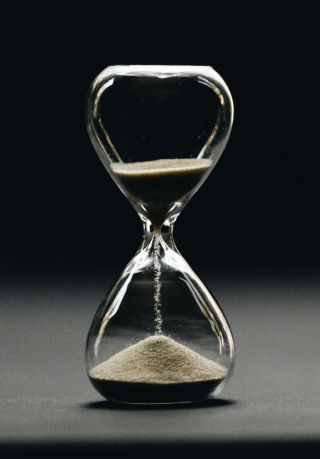Time Management
Time Poverty: Myths, Facts, and Solutions
Though the concept is overhyped, practical time management tips can still help.
Posted June 3, 2024 Reviewed by Margaret Foley
Key points
- Claims about the health effects of time poverty are often overhyped and based on weak evidence.
- Perceived lack of time is subjective and influenced by societal narratives.
- Effective time management can mitigate stress and improve task completion.
- Practical strategies like time audits and blocking time are beneficial.

Burnout has become a growing concern, at least in the popular press, since the beginning of the pandemic. Burnout is regularly attributed to overwork[1], and for the last decade or so, there have been claims that overwork[2] leads to increased risk of death due to heart attack and stroke (Kivimäki et al., 2015). Recently, Ogden (2024) delved into the concept of time poverty, which can be defined as the “chronic feeling that you don’t have enough time for the things that you need to do” (para. 2). The article argues that it can be detrimental to people’s lives in general and to their health specifically, pointing toward increased rates of mental health problems and divorce. It also identifies overwork as a chief source of time poverty.
The biggest problem with the article is that most of the claims made about the effects of time poverty are overhyped. Although it is accurate that most people who report time poverty cite it as a source of stress, the associations between time poverty and various well-being outcomes (e.g., satisfaction, happiness, self-assessed mental health) are meager, with very few actually approaching moderate strength (see the list of effect sizes reported in Giurge et al., 2020). Additionally, the claim that time poverty is somehow more detrimental than unemployment is to one’s mental well-being doesn’t appear to be grounded in any solid evidence[3]. Finally, the implication that time poverty is going to somehow lead to increased risk of death from a heart attack or stroke requires a lot of logical leaps[4].
The overhyping of the dangers and risks of time poverty undermines the arguments put forth in the article, which is unfortunate, because we do live in an age where it has become very easy to find ourselves under a seemingly constant time crunch. In our jobs, we are often required to do more with less. And in our lives in general, there are constant opportunities for distractions and intrusions that adversely affect how we manage our time.
These demands, distractions, and intrusions can quickly result in a perceived lack of time. And perceived lack of time can create stressful situations, which are those “a person appraises as significant for his or her well-being and in which the demands tax or exceed available coping resources” (Lazarus and Folkman, 1986, p. 63[5]). So, perceived lack of time has some adverse effects on us. It can be a source of stress, and it can adversely affect our ability to successfully accomplish various tasks.
Overwork may be a potential source of time poverty, but unlike the claims made in the article, it is not necessarily a predominant source of time poverty. There is likely significant variation across different professions and individual circumstances. Additionally, people often overestimate their busyness, influenced by societal narratives that glorify busyness as a status symbol (Bailey, 2016). Finally, it's essential to recognize that perceptions of time poverty are highly subjective. What one person deems an overwhelming schedule another person might see as manageable, and so what even constitutes overwork might be affected by one’s subjective experience of work.
Still, it stands to reason that if we find ourselves consistently feeling as though we lack the time necessary to accomplish various demands, then we would benefit from making some alterations to how we manage our time. After all, as I argued when discussing work-life balance, time is a finite resource. We cannot expand how much time we have, and so our only choice is to learn to better manage it.
And that brings me to the five suggestions offered in Ogden's article:
- Just say no.
- Do a time audit.
- Outsource your chores.
- Write an "I did" list.
- Block your time.
I’m not going to spend much time on suggestion 1 because it’s a recommendation that is repeated again and again in discussions about improving work-life balance. I will, though, point out that this is one of the few articles that mentions trade-offs one might have to make when using that tactic to avoid new time demands (e.g., looking less likeable or dependable).
Suggestion 2, however, is one that can benefit almost anyone who regularly feels like they lack sufficient time to accomplish their life demands. There are lots of useful websites out there to aid in conducting your own time audit. Clockwise (2022), for example, offers a reasonable step-by-step approach, a template for tracking time, and a useful conceptual tool (i.e., the Eisenhower Matrix) for classifying various tasks moving forward. There are also plenty of apps and software available for time tracking and auditing.
Suggestion 3 can also be quite useful for folks. But outsourcing chores requires sufficient financial resources, and if those are absent, the options here are limited. However, even if some demands can be outsourced, that could be sufficient to free up some time. If this suggestion is implemented, though, it’s important not to immediately fill up that time with something new[6].
Suggestion 4 won't help you feel like you have more time unless your problem is that you're trying to do too much because you never feel like you accomplish anything. If that’s the case, suggestion 4 might be quite useful. Otherwise, suggestions 2, 3, and 5 are a better bet.
Suggestion 5 can be quite useful, especially if you conduct a time audit and find you allow too many interruptions that distract you from your task at hand. It can also be helpful if you have a propensity to multitask, which is generally quite inefficient[7].
To wrap things up, while some of the claims made in the article about the health risks of time poverty are overstated, this does not diminish the importance of learning to better manage time. It’s a finite and limited resource, so once it’s gone, it’s gone. The good news, though, is that for most people, there are some reasonable steps that can be taken to at least reduce the constant feeling of having insufficient time. By incorporating practical time management strategies, we can better navigate the complexities of modern life.
References
Footnotes
[1] There is evidence to support the claim that overwork can be a cause of burnout, but by no means is it the only or necessarily the strongest cause.
[2] Current research tends to define overwork as working 55+ hours per week or 10+ hours per day.
[3] Maybe there’s a study out there that found such a thing, but if so, I’ve never seen it. I also examined the linked source for that claim. The problem is that the source itself never actually reported that. It was in the abstract of some working paper that got removed before the article itself was published (and the claim was removed as well). Regardless, there’s no reason to believe that feeling like one doesn’t have enough time would be worse for one’s mental well-being than losing one’s job.
[4] Yes, there is evidence that stress and overwork are associated with increased mortality from heart attack and stroke (e.g., Kivimäki et al., 2015; WHO, 2021). The problem is that almost none of them report the absolute risk. They report only relative risk, which means there’s no frame of reference for interpreting the results.
[5] See also appraisal theory.
[6] Otherwise, what was the point of freeing up the time to begin with?




